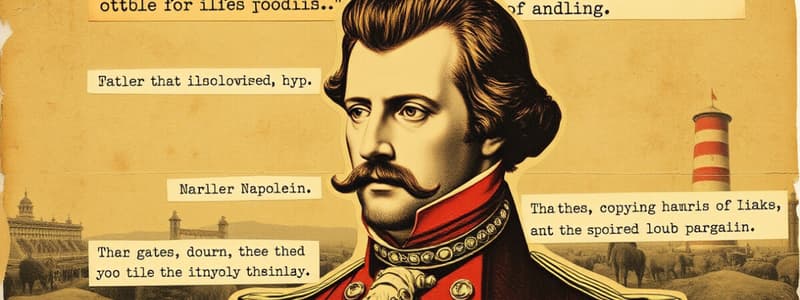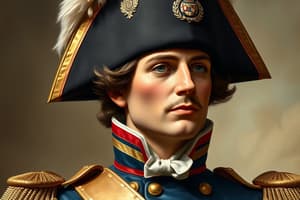Podcast
Questions and Answers
What does the phrase 'large, rather fierce looking' foreshadow about Napoleon?
What does the phrase 'large, rather fierce looking' foreshadow about Napoleon?
- His cooperation with other leaders
- His role as a caretaker
- His kindness to other animals
- His violence and domination over the farm (correct)
What does Napoleon's reputation for getting his own way imply?
What does Napoleon's reputation for getting his own way imply?
He is stubborn and politically violent.
Napoleon shows empathy for his fellow animals.
Napoleon shows empathy for his fellow animals.
False (B)
What does Napoleon's action of taking puppies away for 'seclusion' signify?
What does Napoleon's action of taking puppies away for 'seclusion' signify?
How does Napoleon address the needs of animals in a food crisis?
How does Napoleon address the needs of animals in a food crisis?
What does 'Napoleon acted swiftly and ruthlessly' reveal about his character?
What does 'Napoleon acted swiftly and ruthlessly' reveal about his character?
Napoleon evolves to embody the moral codes of Animalism throughout the story.
Napoleon evolves to embody the moral codes of Animalism throughout the story.
What does Napoleon carrying a whip signify?
What does Napoleon carrying a whip signify?
What does the change of the farm's name back to Manor Farm indicate?
What does the change of the farm's name back to Manor Farm indicate?
What is implied by the phrase 'God-like, omnipotent features are prescribed to Napoleon'?
What is implied by the phrase 'God-like, omnipotent features are prescribed to Napoleon'?
What does 'foolish custom' refer to in Napoleon's behavior?
What does 'foolish custom' refer to in Napoleon's behavior?
Flashcards are hidden until you start studying
Study Notes
Napoleon in Animal Farm: Key Concepts and Quotes
- Napoleon's fierce appearance foreshadows his violent and dominating nature, likening him to a predator driven by a thirst for power.
- His strong reputation for insisting on his way indicates a stubborn character, illustrating the theme of political violence inherent in his leadership.
- Self-interest emerges early as he declares, "never mind the milk, comrades!" This moment symbolizes the initial signs of corruption following the revolution, emphasizing dramatic irony for the reader.
- Napoleon's decision to take the puppies away for "seclusion" highlights his exploitative tendencies, contrasting with the principles of animalism and showcasing his desire for individual power.
- His dismissive remark that Snowball's efforts would fail displays a lack of persuasive capabilities and a weakness in leadership, overshadowed by his violent tendencies.
- Fear is used to manipulate the animals, as Napoleon employs food scarcity to push his agenda, fostering a survival mentality among them.
- The vivid imagery of "enormous dogs wearing brass-studded collars" creates an atmosphere of fear, emphasizing the brutality of Napoleon's regime through the use of alliteration.
- Napoleon's swift and ruthless actions, such as stopping the hens' rations, reveal his controlling and merciless character, devoid of empathy and violating animalism’s core principles.
- The brutality of Napoleon’s leadership is underscored when he orders the execution of dissenting animals, showcasing a lack of emotional response to their suffering, hinting that power corrupts him further.
- Described as the "father of all animals," Napoleon embodies god-like authority, demanding loyalty while increasingly exhibiting traits of superiority over his fellow animals.
- His wearing of an old bowler hat directly contradicts the third commandment, showcasing his departure from the initial ideals of the revolution.
- At twenty-four stone, Napoleon’s physical dominance reflects a stark contrast to the starving animals, highlighting the disparity caused by his gluttony and exploitation.
- His living conditions of luxury, including light and three-day workweeks, sharply contrast with the spirit of animalism, revealing his hypocrisy and abandonment of the original commandments.
- The image of Napoleon carrying a whip signifies an escalation of tyranny, reinforcing his ruthless leadership style.
- By labeling traditional customs as "foolish," Napoleon hypocritically dismisses the core values of animalism while exploiting the lower animals for his gain.
- The renaming of the farm back to Manor Farm signifies a return to the oppressive status quo, illustrating the cyclic nature of power dynamics and betrayal of the animals' initial hopes.
Studying That Suits You
Use AI to generate personalized quizzes and flashcards to suit your learning preferences.




